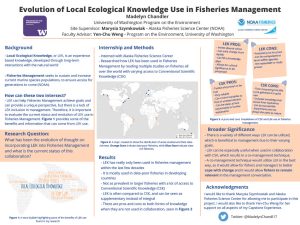Evolution of Local Ecological Knowledge Use in Fisheries Management
Local Ecological Knowledge (LEK) is an experience-based knowledge that can be utilized to solve different environmental problems. The use of LEK varies across different disciplines and can be beneficial in many different ways. Fisheries management is one discipline that has started to incorporate LEK, with hope that it could help them accomplish their goals, which include conservation and sustaining stock. The purpose of this study is to evaluate the evolution of thought on incorporating LEK into fisheries management. During my internship with Alaska Fisheries Science Center (NOAA), I read many studies that gathered and used LEK in fisheries management. I compared these studies to each other to determine areas where LEK use was most prevalent and what role it had in those cases. I used each source to track the evolution of thought on incorporating LEK into fisheries management and found that LEK has really only started to be highly utilized in fisheries management in the last 30 years or so. LEK use has been beneficial to fisheries that are data-poor, or that only have LEK to rely on, and has been seen as supplemental to conventional scientific knowledge in larger scale fisheries. LEK has the potential to be an indicator for further study as well, which inspires hope for its future use in fisheries management of all different scales.
